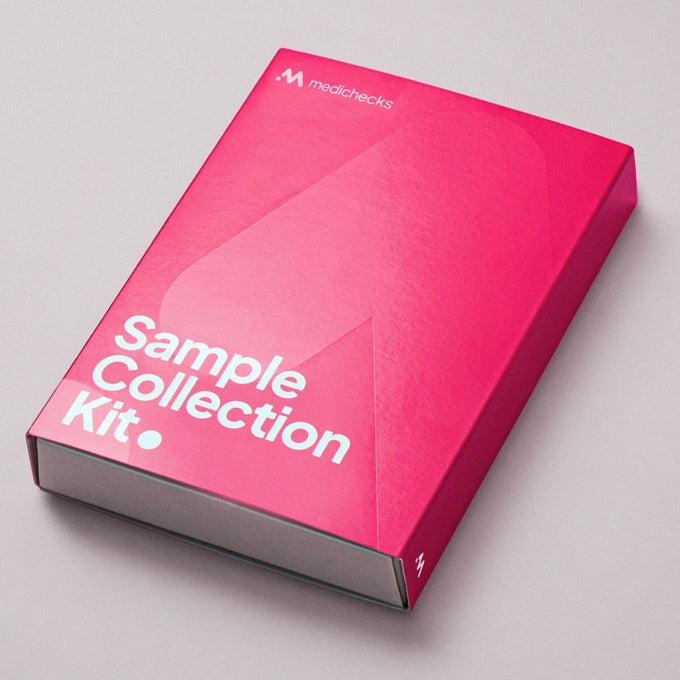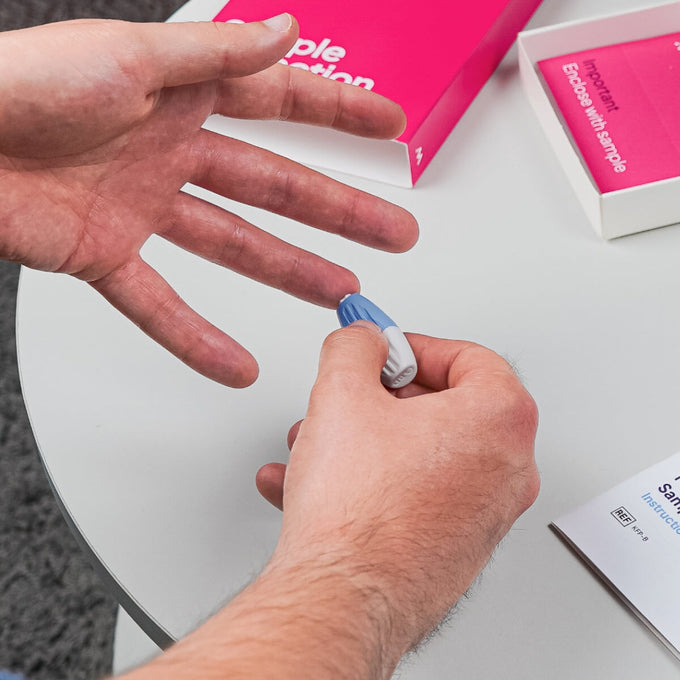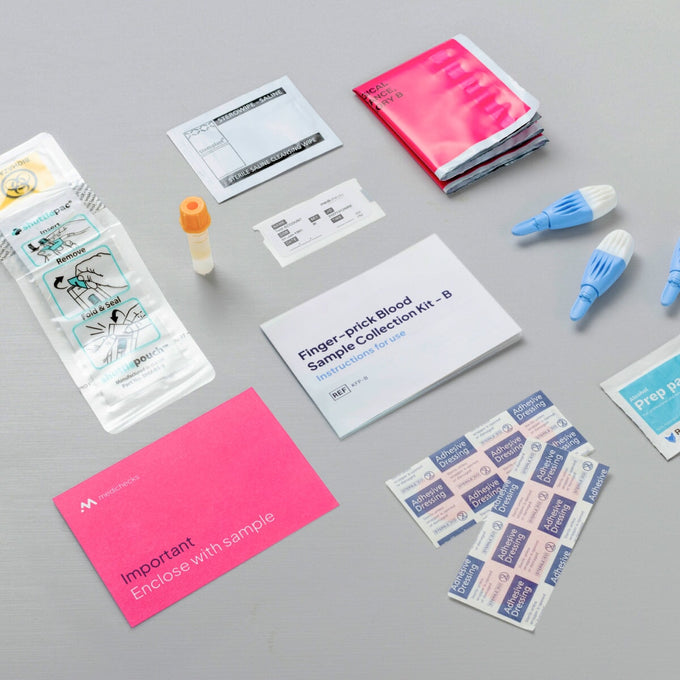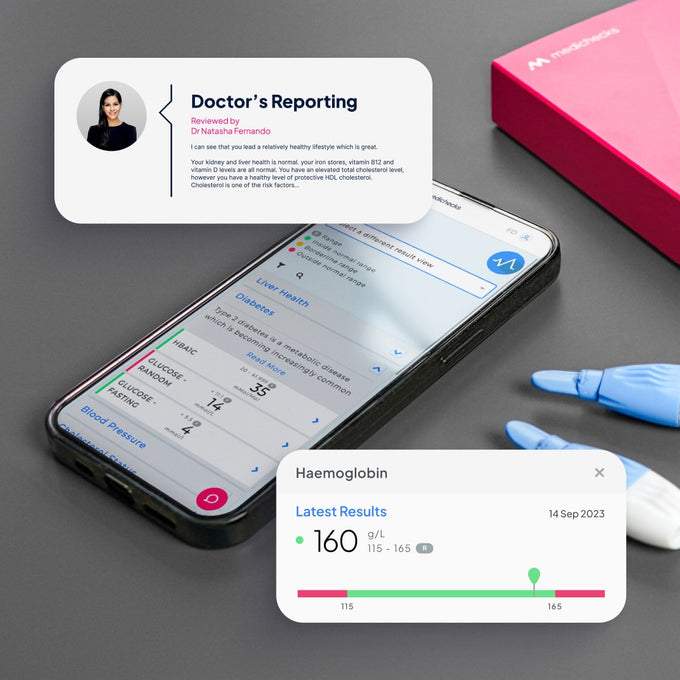Cortisol Blood Test, from our experts to you.
Dr Sam Rodgers MBBS, MRCGPChief Medical Officer

What is cortisol?
Cortisol is a steroid hormone made by your adrenal glands. It has several functions including helping to regulate your blood pressure, blood sugar levels, and inflammation in your body. It’s also known as the stress hormone because it helps your body respond to stress.
When you’re stressed, more cortisol is released, helping to trigger the fight-or-flight response and prepare your body to deal with perceived threats.
Short-term stress is normal and can help us deal with challenging situations. But our busy modern lives can lead to long-term (chronic) stress, with continuously raised cortisol levels. This can be harmful to our health and has been linked to an increased risk of conditions like cardiovascular disease and diabetes.
What is a 9am cortisol blood test for?
Our cortisol test checks if your cortisol level is too high or too low. An abnormal cortisol level isn’t usually a sign of a medical condition that needs treatment. Higher-than-normal cortisol levels are usually caused by stress. Other common causes include over-exercising, pregnancy, and obesity.
However, in rare cases, an abnormal cortisol level could indicate an adrenal gland disorder. Adrenal gland disorders include Cushing’s syndrome (a condition caused by too much cortisol in the body) and Addison’s disease, where the adrenal glands are damaged and don’t make enough cortisol.
These conditions can be serious if left untreated, so it’s important that you see your GP for further investigation if you have any signs or symptoms.
What are the symptoms of a high cortisol level?
Regular and prolonged exposure to high cortisol levels can be harmful to your health. Common signs and symptoms of a high cortisol level include:
-Weight gain — particularly around your stomach, upper back, and face
-Fatigue
-Acne
-Anxiety and depression
-Bruising and slow wound healing
-Thinning hair
-Difficulty concentrating
-Sleep problems
Limitations of the test
Although a Cortisol Blood Test can tell you if your cortisol level is outside the normal range, it cannot pinpoint the cause. It’s important to see your GP if your level is abnormally high or low, as this may indicate a condition that needs treatment.
Even if your result is normal, you may still have an adrenal condition. If you have symptoms of Addison’s disease or Cushing’s syndrome, you should visit your GP who will likely request further tests.
It’s important to take your cortisol level test before 10am or your result will be interpreted against the incorrect reference range by our lab. If this happens, you could receive an abnormal result, even though your level is within the normal range.
Women taking hormonal contraceptives may have elevated cortisol levels. Steroid medication such as prednisolone can also affect your cortisol level. If taken in large doses over a long period of time, your test result could be abnormally high. Low levels can occur if you stop taking this medication suddenly.
What's Included?
How to prepare for your test
Special Instructions
Prepare for your Cortisol Blood Test by following these instructions. Please take your sample before 10am. Hormonal contraception can affect this test, taking a break from this and using barrier contraception will give more accurate results. Corticosteroid medication can affect this test, ask your doctor whether to stop before testing. Do not take biotin supplements for two days before this test, discuss this with your doctor if it is prescribed.
Frequently asked questions
What is a normal level of cortisol?
The normal range for cortisol levels varies greatly depending on the time of day. For guidance, the reference range used for a 9am cortisol blood test, for adults who aren’t taking steroid medication, is around 166–507 nmol/L, although this can vary a little depending on the lab that analyses your sample. Learn more about how labs set reference ranges in our blog.
How can I reduce my cortisol level?
If your cortisol level is high, how you reduce it will depend on the underlying cause. If it’s due to an issue with your adrenal glands, pituitary gland, or medication, you will need help from your GP to improve it.
If it’s due to chronic stress, there are many lifestyle changes you can make to help lower your stress levels. These include taking regular exercise, eating a healthy diet, and cutting down on caffeine, which can raise the level of cortisol in your blood.
Can I take a 9am cortisol test at home?
Yes, you can take a cortisol home test with our finger-prick blood test kit. We’ll send you everything you need, including clear instructions on how to test cortisol levels at home, and a pre-paid return envelope for your sample.
How can I test my cortisol level at home?
Our home cortisol test includes a full lab analysis of your blood sample. You can access your results on your MyMedichecks dashboard, alongside doctor’s advice and any next steps
How to reduce stress and cortisol levels naturally
Stress causes the release of more cortisol in our bodies, triggering the flight-or-flight response. Although short-term stress is normal, chronic (long-term) stress and continuously high cortisol levels can lead to health problems. There are many natural ways to reduce stress and cortisol levels. These include listening to relaxing music and meditation. You might even try some more unconventional ways to reduce stress — find what works best for you. You can find out more in our Stress Hub.





